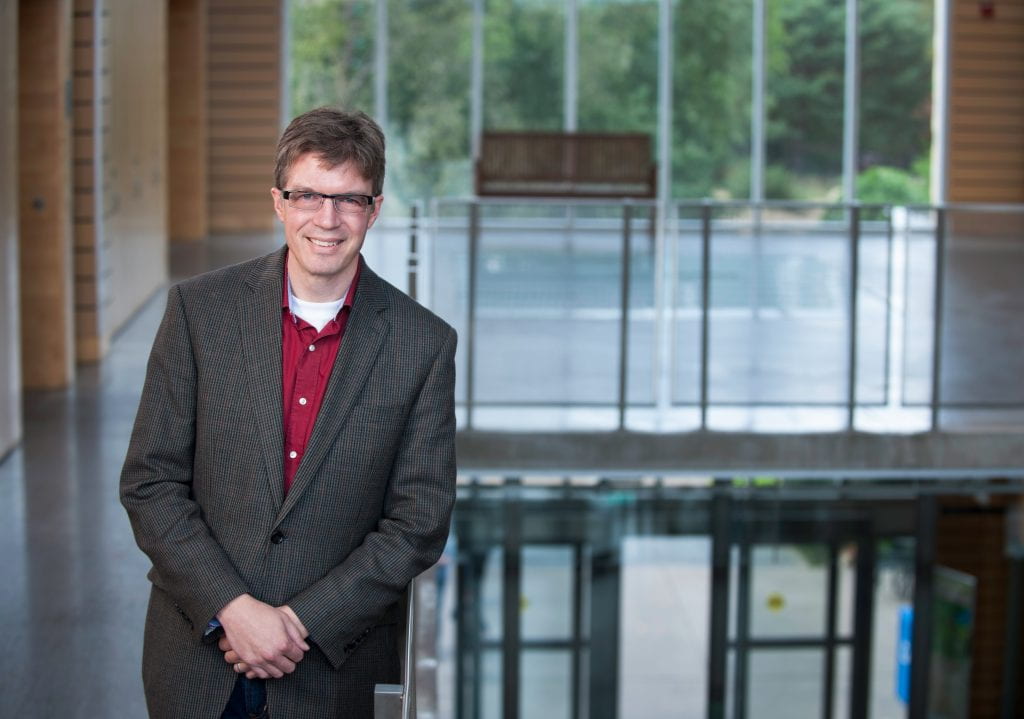Get to know Frank Douma, guest speaker at the inaugural Vehicle Technology International Conference
The inaugural Vehicle Technology International Conference begins one week from today at the Victoria Inn Hotel & Convention Centre in Winnipeg. RRC is pleased to welcome a range of speakers who will be covering topics relating to the evolution and future of vehicle technology in Canada in beyond.
Frank Douma is one of the guest speakers featured at this year’s conference. He is director of the State and Local Policy Program at the Humphrey School of Public Affairs, and a research scholar at the Center for Transportation Studies, both located at the University of Minnesota. His research focuses on policy and legal issues related to transportation technologies. He has authored several legal and academic articles on the topic, and been quoted in newspapers ranging from the New York Times to the Fergus Falls Daily Journal.
Get to know Frank Douma below:
Tell us a little bit about yourself – your background, field of interest, where do you work and what are your areas of expertise?
 “My research focuses on policy and legal issues related to transportation technologies, including telework, tolling and other transportation finance tools, safety, and self-driving vehicles. I have had an interest in transportation issues for much of my life, but had no idea that I could make a career out of studying them until the summer after my third year at Grinnell College, when I participated in an internship in Southeast England. For eight weeks, I studied the anticipated impacts of the opening of the Channel Tunnel on the Borough of Ashford, a railroad town that became the only rail stop between London and the Tunnel.
“My research focuses on policy and legal issues related to transportation technologies, including telework, tolling and other transportation finance tools, safety, and self-driving vehicles. I have had an interest in transportation issues for much of my life, but had no idea that I could make a career out of studying them until the summer after my third year at Grinnell College, when I participated in an internship in Southeast England. For eight weeks, I studied the anticipated impacts of the opening of the Channel Tunnel on the Borough of Ashford, a railroad town that became the only rail stop between London and the Tunnel.
This exposure to planning as a practice led me to obtain a Masters Degree in Public Affairs and a Law Degree from the University of Minnesota. The decision became fortuitous as my work in Ashford helped me obtain a research assistant position at the Humphrey School, looking at the potential environmental issues created by new transportation technologies. As I moved towards graduation and beyond, I parlayed that work into positions with the Twin Cities’ Metropolitan Airports Commission, Minnesota Department of Transportation, and the Canadian Pacific Railway.
I returned to academia in 1999 as a Research Fellow with the State and Local Policy Program, the same organization I worked with as a student at the Humphrey School. I was named the second Director in the history of the State and Local Policy Program in October 2015.
I have been quoted in news stories in the New York Times, and Wall Street Journal, as well as the Minneapolis Star Tribune, Fergus Falls Daily Journal and White Bear Press – given the name of the Program, I’m most proud of the latter stories! – along with authoring a number of articles in legal and academic journals. Also, while work and family life seem to have colluded to keep me from further travel abroad (except Canada), and I have never been in a tenured or tenure track academic position, I believe my ability to find new research opportunities and define key research questions for nearly 20 years comes from understanding bureaucratic politics and understanding the meaning of life through and courses in the works of Tolstoy and Dostoevsky.”
What sparked your interest in vehicle technology?
“I have always had an interest in transportation, but my first exposure to advanced technology came with my student position at the Humphrey School, where I joined a project examining the possible impacts of “Intelligent Vehicle/Highway Systems” (now “Intelligent Transportation Systems”) on the environment. At the time, many environmentalists and others interested in social justice were skeptical that these new technologies were going to solve the existing disparities in transportation, where those who could not afford to, or were otherwise unable to, drive their own vehicle face a significant disadvantage. Since then, I have looked at ways technology could be used to address those disparities.
A breakthrough opportunity presented itself when Google re-charged the conversation about the possibility of self-driving vehicles becoming a reality, because once we remove the requirement of having to own and be physically able to drive, the ability to access transportation that is available when one wants it, at an affordable price, becomes possible.”
Give us a taste of the topics you’ll cover at the Vehicle Technology International Conference?
“I will focus on the policy level obstacles and opportunities I mention above, as they relate to development and deployment of connected and automated vehicles. I will outline some of the misconceptions (such as how we cannot deploy the technology because lawyers will prevent it) as well as some of the real opportunities for deployment. I’ll further note that there still is room for improvement and change in policy if we want to address the disparities I mention above, however. Hopefully, some of the lessons I have learned in looking at this topic from the US perspective will also lead to useful insight on Canadian policy and law as well!”
